|
|
|
Sort Order |
|
|
|
Items / Page
|
|
|
|
|
|
|
| Srl | Item |
| 1 |
ID:
117034
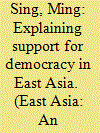

|
|
|
|
|
| Publication |
2012.
|
| Summary/Abstract |
This paper aims to explain public support for democracy in six East Asian societies using the 2006 AsiaBarometer data. The project investigates whether East Asians' support for democracy is primarily based on perceived political performance, such as satisfaction with human rights, or perceived economic performance. The work also examines whether East Asians' support for democracy is constrained by traditional values or the postmodern value of post-materialism. The analysis shows that for three democracies, satisfaction with human rights, i.e. perceived political performance and an intrinsic value embodied in democracy, counts more in shaping public support for democracy than perceived economic performance. Because support based on perceived economic performance is more volatile than support based on firm commitment to human rights, this finding sheds positive light on the prospects for democratic stability for the three East Asian democracies. For three East Asian autocratic societies, democratic support is based more on perceived economic rather than political performance, casting a pall on the future prospects for democratization of them. That said, these dim prospects are balanced by the finding of very weak and negative effects of some traditional Asian values on democratic support.
|
|
|
|
|
|
|
|
|
|
|
|
|
|
|
|
| 2 |
ID:
175473
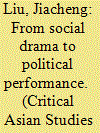

|
|
|
|
|
| Summary/Abstract |
This paper analyzes the social crisis of the Covid-19 epidemic and the government responses in China from a performance perspective. It argues that the epidemic outbreak in late December 2019 initiated a highly contested social drama, in which loyalty was tested, political order questioned, and ideological crisis made visible. The numerous netizens and residents drew on a wide-ranging repertoire of discourses, symbols, and narratives to heighten public spectacles of suffering and sympathy, which placed extensive blame on the lies, negligence, and censorship of the government. Nonetheless, within the short span of three months, the conflictive, cacophonous social drama was overshadowed and subsumed by a hegemonic political performance of national victory, unity, and patriotism, framed and channeled by state propaganda, censorship, ritual, and practical policies. Social protests in cyberspace continued in even more dramatic forms. But these it only constituted sporadic performances of resistance, rather than a monumental social drama that challenged the fundamental political order.
|
|
|
|
|
|
|
|
|
|
|
|
|
|
|
|
| 3 |
ID:
137238
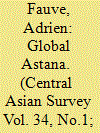

|
|
|
|
|
| Summary/Abstract |
This paper examines how, in post-Soviet Kazakhstan, both channels of elite and banal nationalism (such as sports and higher education) serve as instruments to promote the country. Through these channels, Kazakhstan is portrayed as an open, dynamic and successful country, an image which is in serious disjuncture with the authoritarian nature of the regime. Taking advantage of massive oil revenues, the government organized a significant OSCE general conference in 2010, while chairing the institution. In addition, it created the Astana professional cycling team, which rapidly became a world leader in the sport. Last but not least, Nazarbayev University, attracting prominent Western scholars, is now designed to make the country compete in the international arena of academic rankings. Domestic and international performances are thus treated as instruments to promote the legitimacy of the state at national and global levels. But this would not be possible without the help of individual actors who actively participate in this process. A close investigation shows that their social capital is based on global connections in various spheres (sports, finance and academia). This paper draws on evidence gathered through qualitative methods of enquiry (participant observation and semi-structured interviews). Finally, Astana is treated as a Latourian actor-network that has its own life and agency, thanks to the global association of various human actors and material objects.
|
|
|
|
|
|
|
|
|
|
|
|
|
|
|
|
| 4 |
ID:
118529
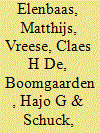

|
|
|
|
|
| Publication |
2012.
|
| Summary/Abstract |
Public evaluations of EU performance are not only critical indicators of the EU's output legitimacy, but also shape future support for European integration. For citizens to monitor the political performance of the EU they need relevant facts, yet it is anything but clear that gains in information about EU performance cause change in judgements about such performance. Drawing on two-wave panel data, this article examines whether acquiring information following a real-world EU decision-making event alters citizens' judgements about the utilitarian and democratic performance of the EU. It also examines how this effect differs for people with different levels of general political information. It is found that citizens who acquired performance-relevant information became more approving of the EU's utilitarian performance but did not change their judgements about its democratic performance. Also, individuals with moderate levels of general political information were affected most strongly by new facts about performance. The implications of these findings for EU-level representative democracy are considered.
|
|
|
|
|
|
|
|
|
|
|
|
|
|
|
|
| 5 |
ID:
129525
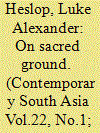

|
|
|
|
|
| Publication |
2014.
|
| Summary/Abstract |
April 2012: In Dambulla, a bustling market town built around a crossroads on the northern cusp of Sri Lanka's central province, a mosque was attacked by a procession of protestors led by the chief priest of the nearby Buddhist temple. Ostensibly the protest was against the presence of the mosque on the grounds that it had been built in an exclusively Buddhist 'sacred area'. Beginning with an empirical account of the attack on the Dambulla mosque, this paper argues that the preservation of what is deemed to be 'sacred' in Sri Lanka provides an effective idiom through which certain religious figures can intelligibly articulate political claims whilst maintaining critical distance from the dirty world of 'Politics'. Corollary to this, and drawing on two years of ethnographic fieldwork in Dambulla, the paper explores the various different meanings of politics locally: highlighting the interplay of everyday politicking and high-profile political performance.
|
|
|
|
|
|
|
|
|
|
|
|
|
|
|
|
| 6 |
ID:
187413
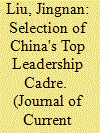

|
|
|
|
|
| Summary/Abstract |
This article provides empirical evidence to show how the general secretaries of the Chinese Communist Party dominated provincial personnel through their factional ties. Based on panel data from 1993 to 2017, this study finds that the provincial leaders’ personal connections with the incumbent party head significantly increased their promotion chances. The positive effect of the incumbent party heads on promotion did not depend on provincial leaders’ economic performance and seniority. This study further uncovers that working experiences in the prefectural leading positions strongly increased the likelihood of promotion. However, connections with other important top leaders did not have similar effects. These findings challenge the traditional wisdom on the collective leadership and indicate the dominance of the Chinese Communist Party's heads for provincial personnel arrangements.
|
|
|
|
|
|
|
|
|
|
|
|
|
|
|
|
| 7 |
ID:
118427
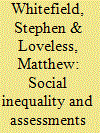

|
|
|
|
|
| Publication |
2013.
|
| Summary/Abstract |
Considerable comparative scholarly attention has been paid to various aspects of mass support for democracy and the market. However, despite strong theoretical suggestions of a linkage, little is known about the impact of social inequality on this support. We address this issue using evidence from mass surveys undertaken in 12 post-communist states in 2007, supplemented by country-level data about economic and political performance. Specifically, we investigate whether social inequality generates negative perceptions that democracy and the market will lead to social conflict and if it increases support for anti-democratic forms of governance. Notably, we find little link between citizens' expectations of social conflict and national-level indices of income inequality. However, we do find a link between perceptions of the extent of social inequality and expectations of market-generated-but not democracy-generated-conflict. Underscoring these positive and negative findings, perceptions of social inequality are also clearly consequential for support for 'strong-hand' economic government but not for anti-democratic leadership.
|
|
|
|
|
|
|
|
|
|
|
|
|
|
|
|
| 8 |
ID:
133946
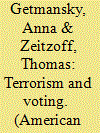

|
|
|
|
|
| Publication |
2014.
|
| Summary/Abstract |
How does the threat of becoming a victim of terrorism affect voting behavior? Localities in southern Israel have been exposed to rocket attacks from the Gaza Strip since 2001. Relying on variation across time and space in the range of rockets, we identify the effect of this threat on voting in Israeli elections. We first show that the evolution of the rockets' range leads to exogenous variation in the threat of terrorism. We then compare voting in national elections within and outside the rockets' range. Our results suggest that the right-wing vote share is 2 to 6 percentage points higher in localities that are within the range-a substantively significant effect. Unlike previous studies that explore the role of actual exposure to terrorism on political preferences and behavior, we show that the mere threat of an attack affects voting.
|
|
|
|
|
|
|
|
|
|
|
|
|
|
|
|
|
|
|
|
|